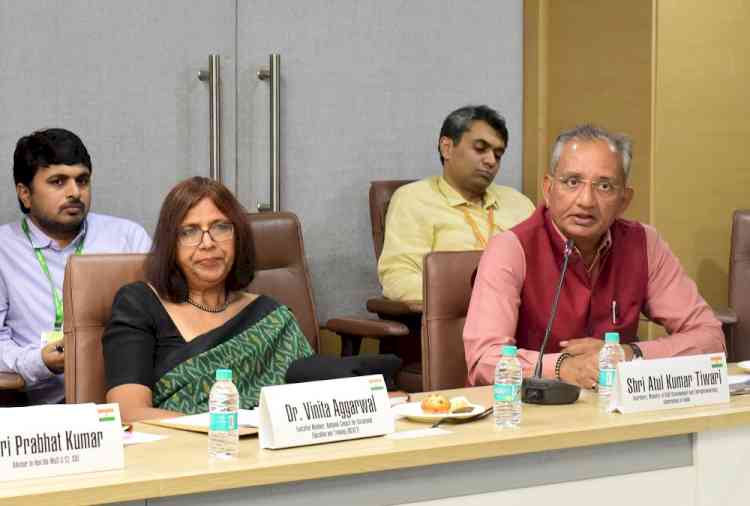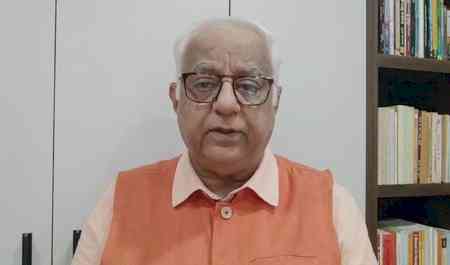Industry reactions on Union Budget (Part-21)

Shailendra Tiwari, Founder, Fasal
“Considering the significant technological progress that agritech startups have brought to farming in India, it is encouraging to see the Union Budget 2023 be a pro-farmer budget, placing focus on technology’s role in farming. The newly announced ‘Agriculture Accelerator Fund’ will further encourage the rise of agritech startups to find innovative solutions to the farmer challenges, as well as nurture entrepreneurial spirit among rural Indians. We welcome the introduction of the ‘Digital Public Infrastructure for Agriculture’ as it empowers and democratises the Indian agri ecosystem (startups, businesses, farmers, etc) to work more collaboratively and find farmer-centric solutions together. We are excited about the government’s ‘Aatmanirbhar Clean Plant’ Programme which can help boost the production of horticulture crops. The push to set up labs to develop apps using 5G for precision farming and other applications can help bring predictability to farming operations. We are confident that this Union Budget 2023 lends an impetus for a greater adoption of technology & data in Indian farming.”
Abheek Barua, Chief Economist and Executive Vice President, HDFC Bank
“The budget recognised that it would have to continue playing the lead role in driving investments in the economy given the rising global risks and only a nascent recovery in the private capex cycle. The capital outlay for 2023-24 was raised to INR 10 lakh cr, a rise of 33% year on year.
The budget also pays heed to the need for fiscal consolidation reducing its fiscal deficit target to 5.9% of GDP in 2023-24 from 6.4% in 2022-23. The resultant lower than expected market borrowing number is likely to bring some relief for the bond market. We see the 10-year bond yield to moderate towards 7-7.1% in FY24.
The budget also announced adjustments in income tax slabs that is likely to boost consumption and savings in the economy, benefitting taxpayers particularly at the lower brackets of the income pyramid.”
Dr. Ganesh Nikam, Managing Director and CEO of Biojobz
"We had bucketed our expectations before the budget into several categories, and it is encouraging to see that the government checked at least some of them. The pharmaceutical industry’s request to incentivise and encourage R&D investments has finally been granted. The new Centers of Excellence programme, aimed to promote pharmaceutical research and innovation, will encourage investment opportunities that will directly fuel the sector expansion and jobs. It will begin to unleash the high innovation potential of rich Indian scientific talent. Also on the direct taxes, the increase in the Income tax rebate limit is a very welcoming step. Overall budget has met a lot of expectations."
Dr. Hari Shankar Shyam, Professor, Management, Sharda University
“As expected, the government has given a boost to skill development among youths by opening an integrated online platform for upskilling, this will be the game changer and will have a significant impact on the economy. Apart from skill development, the government has focused a lot on training and research by opening a centre for excellence of AI and labs for 5G. I am certain this will help a lot with entrepreneurship and many youngsters will come with their startup’s.”
Dr.Mridul Dharwal, Professor of Economics, Sharda University
“Focus on skill development : Set up of 30 skill India international centres across states
Focus on upliftment of tribal students: 740 Residential schools
Focus on Research in Artificial Intelligence: 03 Centres of excellence to be established in education institutions in partnership with industry
Focus on Agri startups: Provision of Agriculture Accelerator Fund for young entrepreneurs.
Focus on availability of learning resources to all through the set up of the National Digital Library.”
Raghunandan Saraf, Founder & CEO, Saraf Furniture
“MSME credit assurance It was proposed last year to revamp the credit guarantee scheme for MSMEs. The revamp scheme, with a corpus infusion of 9000 crores, will go into effect on April 1, 2023. This will enable another two lakh crores of rupees in collateral-free guaranteed credit. Credit costs will also be reduced by about 1%. The infusion of Rs 9,000 crore into the corpus of the Credit Guarantee Fund Trust for Micro and Small Enterprises (CGTMSE) should allow for better and broader scheme implementation, as well as improved claim meeting. This decision is expected to offer a significant benefit to India's MSME sector, which is regarded as a major economic growth driver. Supplemental collateral-free credit is expected to aid MSMEs in meeting the obstacles posed by the global epidemic and allowing them to continue to grow and create employment. It could be a positive step in safeguarding the well-being and expansion of India's MSME sector.”
Ankita Dabas, Chief Growth Officer, Veative Group
“The budget brings laser sharp focus to AI led skill-development by announcing the establishment of three centres of artificial intelligence. Foreseeing the spurt in AI based employment opportunities in the future, Veative Group has devoted 1 million+ manhours over the past decade to create a digital ecosystem in AR/VR, applications for training and development, along with making educational content in VR available globally. We are all set to launch the world’s first careers metaverse in July 2023 that promises to connect enterprises with school-going learners. We wholeheartedly support the govt in making India a leading digital force of reckoning in the world.”
N Chandrasekaran, Chairman, Tata Sons
“Given the challenging macro backdrop of slowing global growth and tightened financial conditions, Finance Minister has aptly prioritized growth.
I welcome the move to more productive expenditure, budgeting capital spending of Rs 10 lakh crore—a 33% increase over the previous year and the highest in the past two decades as a share of GDP. At the same time, the revision of income tax slabs under the new tax regime should increase purchasing power for many. Loan guarantees and other assistance toward MSMEs, a focus on tourism, and measures announced for the care economy (like new nursing colleges) will boost job creation. The budget also remains committed to shared prosperity by extending the free food scheme for one more year.
This budget shows not only the kind of policy support that is necessary for the economy at this moment but also strengthens the strategic foundations for our long-term growth. We are witnessing three major transformations globally: rapid digital adoption, the rebalancing of supply chains, and environmental sustainability. This budget helps position India to play a leading role in all three transformations.”
Ashish Kumar Chauhan, MD& CEO, NSE
“This is a growth-oriented budget, one of the best in years, with a focus on both infrastructure and job creation, while reducing income tax for pretty much everyone, and lots of money to states. The fiscal deficit has been reduced from 6.4% to 5.9% of GDP, with a clear path to reach 4.5% in next three years. The focus on infrastructure, as seen in the rising capex outlay from Rs7.5lakh crore to Rs10 lakh crore, combined with PM Gati Shakti and this Government's ability to execute, would be visible through roads, railways, ports and airports and would translate into demand for basic materials like cement and steel on one hand, and consumption goods from all sections of the society, jobs on the other.
The Budget would support growth and the Indian consumption story, keep us in good stead, given global headwinds in China and developed markets, and until the rest of the world eases.
Before the budget was presented, investors worried about a rise in capital gains. No change there, has also created a positive reaction. Overall this is a very positive budget for the markets, with something for everyone. I give the Budget 10/10.”
Anil G. Verma, Executive Director & CEO, Godrej & Boyce
“This is a balanced and inclusive budget which will provide further impetus to growth. The renewed thrust on investment in infrastructure will drive the productivity of our economy and generate employment. Our competitiveness in the global economy will also be improved through the thrust on research in fields like 5G services, AI and agriculture. Together with the initiatives to reduce the compliance burden and de-criminalise several regulatory provisions, it will improve the ease of doing business in India and attract fresh investments.
Measures to improve rural incomes and reduce personal income tax rates will deliver more disposable income in the hands of people, driving consumption. This will likely generate a virtuous cycle of fresh investments leading to higher employment, incomes and productivity, further spurring consumption. The Green growth focus will orient the entire economy towards adopting sustainable practices in all areas and put us in a good position to play our role in the efforts to improve the future of our planet.
The key to realization of the planned outcomes is effective implementation.”
Kami Viswanathan, Senior Vice President, FedEx Express, Middle East Indian Subcontinent and Africa (MEISA) Operations
“The Union Budget 2023 demonstrated the Government’s vision to expedite infrastructure development, with the announcement to increase capital expenditure. This will help put the economy on an accelerated growth path.
Furthermore, the budget emphasizes the government's commitment towards the "green growth" approach. The indirect tax proposals to boost green mobility will provide a further impetus to accelerate the adoption of EVs in India. This initiative also resonates well with FedEx’s own global goal of achieving carbon neutral global operations by 2040.
Lastly the measures taken to support and enable MSMEs in India, who play a pivotal role in burgeoning the Indian economy, will help accelerate the sector’s growth trajectory.”
Amar Ambani, Group President and Head- Institutional Equities, YES SECURITIES
“In her shortest budget speech that lasted 87 minutes, the sweet spot, without doubt, was the capex intensity budgeted by the Finance Minister. Spurred by a tax bonanza, thanks to formalization of the economy and inflation, the FM accelerated the capex run-rate. Apart from the central investment, states have been allocated a higher share of money with incentives in place to generate a higher spend on capex.
Even though this was the last budget before elections, it’s not been a populist one, with total expenditure estimated to rise by just 9% yoy. This is justified as a large part of spending and expenditure growth took place during the two years of Covid. Subsidies too have been cut after a big rise in last couple of years.
On the fiscal front, the deficit numbers are in line with our expectations for FY23 as well as the target for FY24. With formalization of the economy, we are upbeat on continuance in tax buoyancy and given the present intent on careful expansion in revenue expenditure, it is possible to walk on the FRBM roadmap.”
Dr. Anish Shah, Managing Director & CEO, Mahindra Group
“This is an outstanding budget as it is disciplined, growth-oriented, inclusive and sustainable. The Finance Minister has done a commendable job by tabling a budget that is big on consistency and driven majorly by capex. The steep increase in capex, to the tune of Rs 10 lakh crore, will ensure the continuum of cyclical recovery. Capex spending is good because it has a higher multiplier effect: every rupee spent on capex has a multiplier of Rs 3 as compared to just about Rs 0.9 for revenue expenditure. That apart, higher capex also creates jobs in the hinterland. The focus on core infrastructure, including increased funding for railways and clean energy, as well as the government's ambitious plans for the agricultural sector, will help to improve rural incomes. Above all, it is encouraging to see the government setting the pace for climate action by announcing a "green budget" that will pave the way for a greener, cleaner planet.”
Rajesh Jejurikar, Executive Director (Auto & Farm Sectors), Mahindra & Mahindra Ltd.
“The Budget has struck the right balance between managing growth and fiscal prudence. The reduction in income tax and other taxes will put more money in the hands of consumers, driving consumption and growth in the economy . The Government’s focused investments in infrastructure will support long term sustainable economic growth. The budget enhances the positive sentiment in the country when the global environment has uncertainty.”
Rampraveen Swaminathan, MD and CEO, Mahindra Logistics Ltd
“We welcome this budget as it focuses on sustainable growth and infrastructure development. The announcement of setting up Urban Investment development fund (UIDF) for Tier 2 and Tier 3 cities will provide a much needed boost for smoother and faster logistics transportation and will further ensure greater connectivity in tier-2 and tier-3 cities. Identifying 100 critical transport infrastructure projects will have a positive impact on nation’s last and first mile connectivity. Additionally, the announcement of 50 new airports, helipads, and aerodromes will enhance the regional air connectivity across the country whereas the highest ever allocated capital outlay to Indian Railways will add to the smooth connectivity between different points of country and easy and faster freight movement.”
Ranjita Raman, CEO, Jaro Education
“The Budget 2023 saw the Government lay its focus on skilling of youth – students and salaried professionals, which resonates heavily with the work that the edtech sector is doing. The Budget specified that there will be courses provided in areas like AI, IoT, Robotics, and other soft skills, to steer the youth towards meeting the demands of today. At Jaro Education, we have also been striving to provide courses to our consumers around these new-age requirements. The Government encouraging the same goes a long way in putting it under the spotlight. The Pradhan Mantri Kaushal Vikas Yojana 4.0 is now being united with the needs of Industry 4.0 to align education courses that meet the needs of the industry.
The Edtech industry was hoping for support from the Government in the form of schemes and incentives for improving online initiatives. We hope the Government revisits GST on education, especially higher education and upskilling courses. The current GST on education services is 18%, which is for luxury items. In the current industry dynamics, such education is not luxury but essential and hence, we hope for consideration on the same.”
Vijay Chandok MD & CEO - ICICI Securities
The Union Budget is a testament to the government's vision of achieving a technology-driven and knowledge-based economy, with strong public finances.
The government’s focus on capital allocation is a clear indicator of its intention of bolstering growth and employment in the country. We believe the increment in capital investment outlay for the third year in a row by 33 per cent to 10 lakh crore will empower the government to create an efficient ecosystem that renders extensive growth and prosperity in the country.
The new proposed tax regime will provide major relief to all taxpayers, especially middle class people, providing higher disposable income in their hands. This will enable them to explore more investment avenues and leverage the increasing prowess of the Indian economy. Further, the government's decision of allowing SEBI to develop, maintain and implement norms and standards for education in the National Institute of Securities Markets (NISM) will enhance the competencies of functionaries and professionals in the securities market.
Narinder Bhamra, President, Fastener Manufacturers Association of India (Regd) & Convenor – Federation of Industries & Trade, Punjab
“The budget has nothing to boost MICRO entrepreneurs, no package given to uplift MSE’s, We were expecting creation of separate Ministry for Micro Enterprise, more liberalise labour laws, easing raw material prices such as formation of steel regulator, reduction in GST slab from 18% to 12% etc. Micro Entrepreneurs are facing problems of survival because of fluctuations of steel prices, imports from China etc. & need special package to come out of crises.
- New tax regime is now default tax regime & by increasing limit under this regime from 5 lakh to 7 Lakh, the intension of Govt is to discourage savings. Govt wants that you spend - whatever you earn. There is no mention of Social Security for tax payers such as free medical facility. In Optional Tax slab with standard deductions income tax exemption limit is marginally increased from 2.5 lakh to 3 lakh whereas it should be 5 Lakh considering the inflation. The standard deduction limit under Chapter 6A such as 80C, 80 D etc was kept at 1.5 Lakhs , whereas it should be increased to 3 Lakhs.
- There is no mention of CLCSS ( Credit Linked Capital Subsidy Scheme) which in on halt since 2020. We were expecting the revival of CLCSS with increase of limit from 1 Cr. to 5 Cr.
- Yet again Corporates are given big relief by decreasing surcharge from 37% to 25%. Besides the highest income tax slab for corporates is 15% to 22% + Surcharge. Whereas for firms it is 30% - majority of which is MSE’s. It should have been decreased as per corporates slab.
Once again it is prove that this budget is disastrous for MEME’s as Centre Govt is concerned about Corporates only.”


 City Air News
City Air News 








